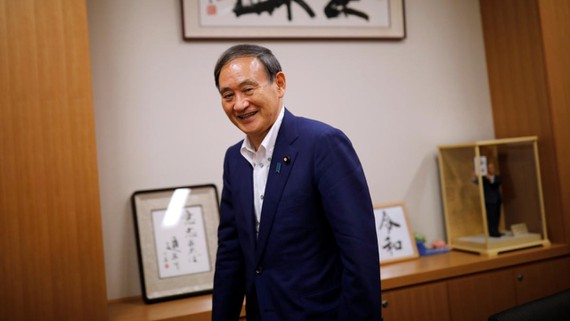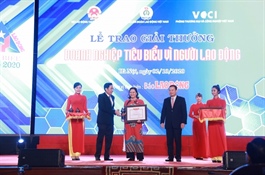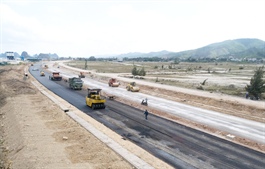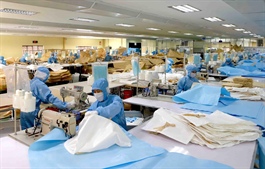What does Vietnam expect from Japan’s new Prime Minister?
What does Vietnam expect from Japan’s new Prime Minister?
Successor of Shinzo Abe, Japan’s new Prime Minister Suga Yoshihide took office on September 16, with a pledge to continue most of his predecessor's domestic and foreign policy.
Tân thủ tướng Nhật Bản Suga Yoshihide.
|
However, analysts believe that the new Prime Minister will have efforts to make its own mark, perhaps Japan in the Suga era will be different.
Softer with South Korea, unknown to China
Suga was the chief cabinet secretary throughout Abe’s record-long term. Most of his political experience is in the domestic field, rather than in international affairs, although he has accompanied Abe on trips abroad and stood by his side during conversations with world leaders. Suga has also served as the top government spokesman since 2012. It was in that role, earlier this year, that he publicly condemned South Korea for making what he said were “unreasonable demands” for compensation relating to the period when Japan occupied the Korean peninsula prior to World War II.
Shigeto Nagai, who heads the Japan team at Oxford Economics, regards Suga as less hawkish and more pragmatic than his rivals. Nagai says: “We are still not sure how Mr. Suga will perform as a prime minister and as the chief diplomat of this country but he might take a more practical approach and he may be more prepared to make compromises than other people in his party.”
Nagai believes that the public mood in Japan is currently more negative toward South Korea than it is on China. He says there may be an economic reason for this: “Japan’s reliance on China is much larger than on South Korea. The challenge for any Japanese prime minister is always to balance the relationship between China and the United States. I think under Mr. Suga’s leadership, Japan will continue to be an important ally of America and at the same time try to be nice to China.”
Meanwhile, Suga has confirmed that he will continue the foreign and security policies of his predecessor. Specifically, the new Prime Minister sees the Japan-US alliance as the foundation of Japan's foreign policy. In addition, he said he would continue to implement the "Free and Open Indo-Pacific Strategy". In particular, Mr. Suga advocates building stable relations with China and neighboring countries.
However, analysts believe that he is likely to continue promoting the program to support domestic enterprises to move their production facilities from China to Japan or to Southeast Asia, in order to reduce over reliance in this neighboring country.
In an interview with the Nikkei Asia Review at the end of April, Suga emphasized that the Covid-19 translation has taught Japan an important lesson about the dangers of over-reliance on China.
Advantages of ASEAN and Vietnam
The sudden announced resignation of Prime Minister Abe Shinzo for health reasons has left many unanswered questions regarding his legacy. In Southeast Asia, a region that lies at the center of the Indo-Pacific, Abe’s efforts to expand and deepen Japan’s presence will be sorely missed. In particular, his departure raises questions about the future direction of Japan’s relations with Vietnam, which has benefited significantly from Japan’s renewed diplomatic activism and currently enjoys a robust partnership with the world’s third-largest economy.
To a large extent, the strong bilateral partnership has been born out of a shared concern about China’s waxing power and influence. Above all, the robust partnership between Japan and Vietnam is underpinned by economic calculations. As a “super-aged” society, with more than 20 percent of its population over the age of 65, as well as a shrinking population, Japan faces an uncertain economic future. A shrinking population means a smaller domestic market and declining labor force, which will have critical implications for economic growth over the long term.
| The task for the new Japanese Prime Minister is to widen this robust cooperation to include other ASEAN members, including Vietnam. |
In contrast, Vietnam’s population is relatively young, which promises not only an abundant supply of labor, but also a promising new market for Japanese products and technology. As a developing country fixed on becoming an industrialized nation, Vietnam can benefit from investment and technology flows from Japan, especially in the realm of vital infrastructure. Therefore, strong cooperation between Japan and Vietnam is likely to continue due to complementary characteristics in both countries’ economies.
Both Japan and Vietnam can capitalize on their robust cooperation to promote greater intra-ASEAN integration. Quality infrastructure projects connecting ASEAN members, supported by Japanese funding and technology, will not only underpin and secure Japan’s continued economic engagement in the region in the years to come; they will also boost the prospect for increased intra-ASEAN trade. Japan has already established a prominent footprint in Vietnam, in terms of economic cooperation and infrastructure development. The task for the new Japanese Prime Minister is to widen this robust cooperation to include other ASEAN members.
Vietnam, too, stands to benefit greatly from a more integrated ASEAN. Regarding the South China Sea disputes, Vietnam has encountered significant challenges in developing a unified ASEAN stance, partly due to China’s economic leverage over other ASEAN members. Vietnam’s economy also relies heavily on China for materials and equipment that are needed in its manufacturing sector, which has helped contribute to its staggering USD 31 billion trade deficit with China. Facing a pandemic-induced recession, a diversification of economic ties to ASEAN and other external partners will only serve Vietnam’s strategic interests over the long term.
























